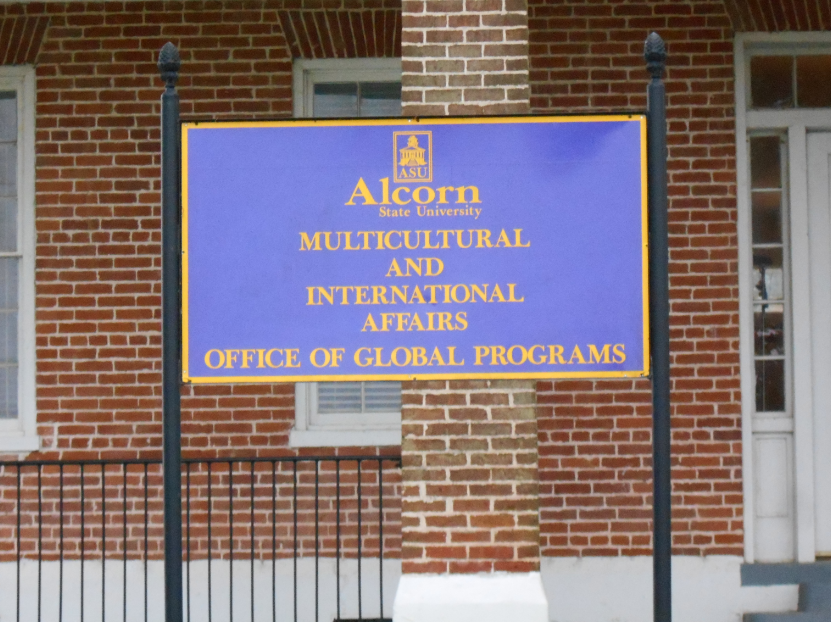Tuesday March 22, 2016, the Alcorn State University Office of Global Programs hosted the United Nations (UN) Food Security Conference. Held in the Medgar Evers Auditorium of the J.D. Boyd Library, the event featured several distinguished speakers; Ambassadors Tuvako Manogi, Permanent Representative of the United Republic of Tanzania and Jeremiah Sulunteh, Ambassador Extraordinary and Plenipotentiary Republic of Liberia; Theodore Lyng, Director, Office of Global Food Security, US Department, and Nicola David Sakhleh, Chief of the Food and Development Branch at the Foreign Agriculture Service (FAS).
The event began with a welcome from Dr. Dovi Alipoe, Director of the Office of Global Programs. Dr. Alipoe welcomed one and all to the conference, highlighting the importance of food security in both developed and developing nations. He stated, “Food Security is a major issue that affects countries around the world.”
Dr. Donzell Lee, Provost and Vice President of Academic Affairs, also offered greetings to the students, staff, faculty and guests in attendance and thanked them for their participation in the event.
Following the greetings, Steve Ginther, Program Director of the Humpty Dumpty Institute, introduced Ambassador Manogi.
Since July 2012, Manogi has served as Ambassador and Permanent Representative for the United Nations of the Republic of Tanzania. His presentation entitled, “Food Security in Tanzania,” explained the agricultural challenges facing the country.
During his presentation, Manogi referenced the poverty level within the country and abroad. He also discussed the levels of malnutrition in children under 5-years-old, the affect of agricultural challenges and its role in health. The government’s essential role in addressing the problem is the implementation of the “Agriculture First ” program. The program is designed to develop a union to farmers, command better environments for trade, and reduce the impact of climate change.
Manogi expressed, “The will to share knowledge about food production is a great way to bring awareness to food security.”
Following Manogi’s presentation, senior, Biological Sciences major, Mario Martinez, introduced Ambassador Jeremiah Sulunteh.
Ambassador Jeremiah C. Sulunteh is a prominent Liberian politician, administrator and professor. He has worked in the areas of administration, teaching, and politics for more than 30 years. His presentation entitled, “Food Security in Liberia,” described the challenges of agriculture in the country. Sulunteh gave an analysis of the poverty levels in the country in both rural and urban areas. He also discussed problems in nutrition such as underweight and stunted growth.
He explained the government’s role in the country to combat all of the issues with food security. They’ve committed to increase the agriculture budget from 3 percent to 10 percent in 2017. They’ve also implemented a 5 year USDA Feed the Future program. He discussed the new policy directions for the agriculture sector through the ministry of agriculture at the Central Agriculture Research Center.
Theodore Lyng gave a presentation entitled, “Feed the Future: The US Government and Global Food Security.” Lyng explained the role of the government in its initiative to establish food security in affected countries around the world. He discussed the history of global food challenges and the role of organizations in securing healthier foods for the people within those countries.
He explained the goal of SDG2 to end hunger by the year 2030, to achieve food security, improve nutrition and promote sustainable agriculture. Some U.S. programs include, Humanitarian and Emergency Assistance which aids people in the midst of an emergency, and Feed the Future, a flagship program designed to teach communities to feed themselves. The government also plans to combat emerging issues in food security through food loss and waste urbanization, inequality in buying power, innovative financing and other crises.
After a quick break, the next speaker, Nicola Sakhleh, presented on the topic of the U.S. response to food security. During the presentation, Sakhleh broke down the branches of the USDA Food Security and described their roles in providing assistance in food security. According to the USDA, 815 million people globally are battling food insecurities. The income per capita in many households are below $3,961.00 which results in malnutrition in children under the age of 5-years-old.
The USDA aids through several programs which focus on basic and applied research, improved marketing, and increasing the capacity of government institutions. He gave an overview of Food For Progress, an initiative authorized by the Food for Progress Act in 1985. The program targets developing countries and supports the expansion of private enterprise on agricultural sectors.
“The impact that we’ve had has been slow but steady. The challenges that we are facing are innumerable. I don’t think people realize all that we’ve accomplished with Food for Progress,” Sakleh said.
Following the third lecture and lunch, a plenary session convened. Each speaker was provided a few minutes to summarize their presentations and to address the audience. Dr. Alipoe provided the following closing remarks.
“The objective of this seminar was to bring to the campus community information about the different programs and agencies that are a part of the United Nations and what they do to address issues on food security.”
This event was free and open to the public. For more information about this and future UN Lecture Series events, or for more information about the Office of Global Programs, contact Dr. Dovi Alipoe, Director of the Office of Global Programs at (601) 877-6543 or alipoe@alcorn.edu. To learn more about the United Nations initiatives of food security, visit their website at http://www.un-foodsecurity.org/.
